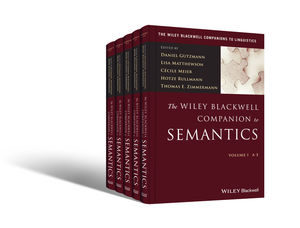ワイリー・ブラックウェル版 意味論大全(全5巻)
The Wiley Blackwell Companion to Semantics
(The Wiley Blackwell Companions to Linguistics)

Editors: Daniel Gutzmann, Lisa Matthewson, Cécile Meier, Hotze Rullmann, & Thomas E. Zimmerman
2020:12 5 vols. 3,360 p. set ISBN 978-1-118-78831-8 (Wiley-Blackwell) -US-
日本総代理店:㈱紀伊國屋書店
☆期間限定在庫特価10% OFF USD 751.45(※弊社在庫分のみ2025年8月31日まで適用)
Web販売価格 ¥123,542 / 標準価格 ¥164,491
通常価格 USD 834.95
Web販売価格 ¥137,270 / 標準価格 ¥182,770
*特価適用は弊社在庫に限り、在庫が完売しお取り寄せになる場合は通常価格に戻りますので、ご了承ください。
*2025年4月21日時点の価格です実際の価格は、為替レートや出版社の都合により変動いたしますので、最新の価格は以下オンラインストアリンクをご参照ください。
*Web販売価格は、紀伊國屋書店BookWeb Proでご注文され、付帯作業を伴わない納品を行い、弊社標準書式による請求書を発行し遅滞なくお支払いただく場合、あるいは、クレジットカードでお支払いいただく場合に適用される販売価格です。
概要
言語における「意味」の探究は、20世紀にチョムスキーの生成文法をはじめとする統語論の革命的なブレークスルーを見た言語学において、最後に残された聖杯のようなものであり、最近数十年における意味論の発展は目覚ましいものがあります。
本書は、好評を博した「ワイリー・ブラックウェル版 統語論大全(第2版・全8巻)」に続く、同じThe Wiley Blackwell Companions to Linguisticsシリーズの新刊として、意味論のもっとも包括的なレファレンスを刊行するものです。今日の意味論の代表的研究者たちが執筆協力した全100章以上にわたる「ケーススタディ」を通して、現代意味論および他の文法部門(統語論など)とのインターフェイスにおけるもっとも重要な論点や現象を、概念的な基盤、競合する諸々のアプローチ、世界の諸言語への応用を含めて、詳細に解説します。(各章はアルファベット順に配列されます。)
意味という捉え難い対象は、認知言語学のような近年有力なアプローチの発展を促してきましたが、その解明に向けて新旧の多様なアプローチの間でさらに対話を積み重ねていく必要があります。本書は、統語論を含む理論言語学全体の中で意味論の今後の方向を考える上で不可欠の基盤となるでしょう。
ご購入サイト
※本件についてのお問い合わせ、お見積りについては、最寄りの紀伊國屋書店営業所もしくはこちらのお問い合わせフォームまでご連絡ください。
収録内容
Volume I
1. Actuality Entailments Valentine Hacquard
2. Ambiguity Massimo Poesio
3. Anankastic Conditionals: “If you want to go to Harlem, …” Kjell Johan Sabo
4. Aspectual Composition: “Drinking (a glass of) milk” Markus Egg
5. Attitude Verbs Hazel Pearson
6. Bare Singulars Alan Munn and Cristina Schmitt
7. Biscuit Conditionals Kyle Rawlins
8. Boolean and Non-Boolean Conjunction Viola Schmitt
9. Clausal vs Phrasal Comparatives Winfried Lechner
10. (Complex) Demonstratives: “This book” Geoff Georgi
11. Compositionality Michael Johnson
12. Concealed Questions Ilaria Frana
13. Conceptual Spaces and Semantic Similarities of Colors Gerhard Jager
14. Context and Conversation Mitchell Green
15. Copular Sentences Caroline Heycock
16. Correlatives Jo-Wang Lin
17. Count Nouns vs Mass Nouns Susan Rothstein
18. Counterfactuals: “If kangaroos had no tails” Ana Arregui
19. Decomposition: “Open the door again” Irene Rapp and Arnim von Stechow
20. Definiteness: “Gagarin was the first human to travel to space” Cecile Meier
21. Dimensions of Meaning Daniel Gutzmann
22. Discourse Particles Patrick G. Grosz
Volume II
23. Distributivity, Collectivity, and Cumulativity Lucas Champollion
24. Donkey Anaphora: Farmers and Bishops Adrian Brasoveanu and Jakub Dotlačil
25. Ellipsis and Identity Daniel Hardt
26. Epistemic Modality Igor Yanovich
27. E-Type Pronouns: Congressmen, Sheep, and Paychecks Rick Nouwen
28. Evaluative Predicates: Beyond Fun and Tasty Carla Umbach
29. Evidentials Sarah E. Murray
30. Exclamatives Elena Castroviejo
31. Expressives Elin McCready (青山学院大学教授)
32. Family Resemblance and Prototypes Galit W. Sassoon
33. Free Choice Disjunction: “An apple or a pear” Marie-Christine Meyer
34. Free Choice Items and Modal Indefinites Luis Alonso Ovalle and Paula Menendez-Benito
35. Free Relatives Radek Šimik
36. Gradable Adjectives and Degree Expressions Marcin Morzycki
37. Graded Modality Daniel Lassiter
38. Idioms: Pull Strings, Spill the Beans, and Kick the Bucket Manfred Sailer
39. Imperatives Magdalena Kaufmann
40. Imperfectivity Ashwini Deo
41. Indefinite–Interrogative Affinity Edgar Onea
42. Index-Dependence and Embedding Orin Percus
43. Indexicality: I, Here, Now Isidora Stojanovic
Volume III
44. Indicative Conditionals Robert van Rooij and Katrin Schulz
45. Information Structure Beata Gyuris
46. Intensional Transitive Verbs: I owe you a horse Florian Schwarz
47. Intentional Identity: From Hob and Nob to Arsky and Barsky Robert van Rooij
48. The Interpretation of Tense: “I didn’t turn off the stove” Toshiyuki Ogihara (荻原 俊幸 ワシントン大学 准教授) and Kiyomi Kusumoto (楠本 紀代美 関西学院大学教授)
49. Intervention Effects: “How many books did you not read?” Clemens Mayr
50. Inverse Linking Constructions: An Apple in Every Basket Malte Zimmermann
51. Kinds of (Non)Specificity Donka F. Farkas and Adrian Brasoveanu
52. Lexical Aspect (Aktionsart) Hana Filip
53. Linguistic Relativity: From Whorf to Now Jürgen Bohnemeyer
54. Literal vs Enriched Meaning: “It’s raining” Paul Elbourne
55. Logical Omniscience Paul Egre
56. Matrix and Embedded Presuppositions Raj Singh
57. Measure Phrases Gregory Scontras
58. Mixed Quotation Emar Maier
59. Modal Concord Janneke van Wijnbergen-Huitink
60. Modal Subordination: “It would eat you first!” Craige Roberts
61. Modal–Temporal Interactions Anamaria Fălăuş and Brenda Laca
62. Modified Numerals Benjamin Spector
63. The Name and Nature of Neg-Raising Jon Gajewski
Volume IV
64. Negative Indefinites and Negative Concord Doris Penka
65. Negative Polarity Vincent Homer
66. Nominal vs Adverbial Quantification Stefan Hinterwimmer
67. Nominalizations: The Case of Nominalizations of Modal Predicates Friederike Moltmann
68. Nonlocal Adjectival Modification: “the wrong number” Bernhard Schwarz
69. (Non)restrictive Nominal Modification: “Dogs that bark don’t bite black ravens” Cathrine Fabricius-Hansen
70. Noun Incorporation Sandra Chung and William A. Ladusaw
71. The Parameters of Indirect Speech Regine Eckardt
72. The Partee Paradox: Rising Temperatures and Numbers Sebastian Lobner
73. The Perfect Atle Gronn and Arnim von Stechow
74. Pluractionality: The Phenomenon, the Issues, and a Case Study Ana Muller and Luciana Sanchez-Mendes
75. Possible-Worlds Semantics for Pictures Dorit Abusch
76. Pragmatic Accommodation Mikhail Kissine and Myrto Pantazi
77. Presuppositional Binding Rob van der Sandt
78. Progressive: The Imperfective Paradox Sandro Zucchi
79. Prosodic Focus Michael Wagner
80. Quantifiers, Scope, and Pseudo-Scope: When a man loves a woman … Wolfgang Sternefeld
81. Quantity Implicatures Andreea C. Nicolae and Uli Sauerland
82. Questions and Interrogatives: Exhaustivity vs Quantificational Variability Paul Hagstrom
83. Representing Intensionality: Variables vs Parameters Thomas Ede Zimmermann
84. Rhetorical Relations Katja Jasinskaja and Elena Karagjosova
Volume V
85. Semantic Change: “What the smurf?” Dirk Geeraerts
86. Semantic Parameters and Universals Sigrid Beck
87. Semantics of English Intonation: “A leopard? A leopard!” Hubert Truckenbrodt
88. Semantics vs Pragmatics Daniel Gutzmann
89. The Semantics and Pragmatics of Appositives Philippe Schlenker
90. Sequence of Tense Yael Sharvit
91. Spatial Prepositions and Locatives in Formal Semantics Marcus Kracht
92. Speaker’s Reference: “Smith’s murderer” Barbara Abbott
93. The Status and Significance of “Impossible Words” John Collins
94. Strong and Weak Nominals Louise McNally
95. The Subjunctive: Truth Be Told Josep Quer
96. Systematic Polysemy Johannes Dolling
97. Temporal Properties of Noun Phrases Judith Tonhauser
98. Tense and Temporal Adverbs: “I learned last week that there would now be an earthquake” Daniel Altshuler
99. Topic Satoshi Tomioka
100. Type Shifting: The Partee Triangle Herman Hendriks
101. Vagueness and Natural Language Semantics Heather Burnett and Peter R. Sutton
102. Weak Necessity Aynat Rubinstein
103. Wide Scope Indefinites: Dead Relatives Cornelia Ebert
Index
(学術洋書部)